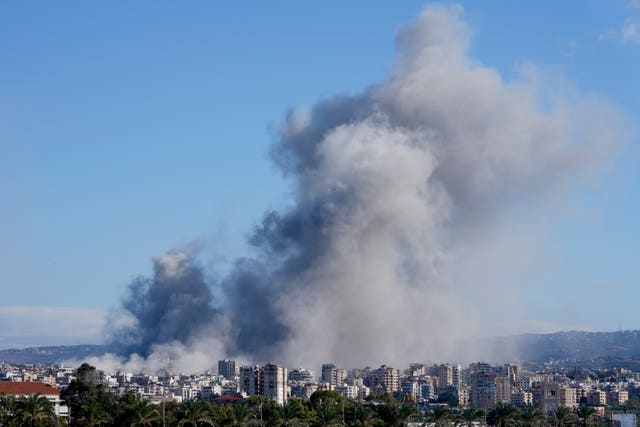Israel bombards Beirut as leaders prepare to vote on ceasefire with Hezbollah
The strike flattened a residential building in the city’s crowded Basta neighbourhood, the second attack on the area in recent days.

Israeli jets have struck central Beirut and the Lebanese capital’s southern suburbs ahead of a planned vote by Israel’s leadership on whether to accept a US-brokered ceasefire deal aimed at ending more than a year of fighting with Hezbollah.
The Israeli military also issued warnings for 20 more buildings in Beirut’s suburbs to evacuate before they were also struck – a sign it was aiming to inflict punishment on Hezbollah down to the last moments before any ceasefire takes hold.
Israeli ground troops also reached parts of Lebanon’s Litani River for the first time in the conflict – a focal point of the emerging ceasefire.

Israeli military spokesman Avichay Adraee issued evacuation warnings for 20 buildings in the suburbs of the capital’s south, as well as a warning for the southern town of Naqoura where the United Nations peacekeeping mission, known as Unifil, is based.
Lebanese officials have said Hezbollah also supports the deal. If approved by all sides, the deal would be a major step towards ending the Israel-Hezbollah war that has inflamed tensions across the region and raised fears of an even wider conflict between Israel and Hezbollah’s patron, Iran.
The deal calls for a two-month initial halt in fighting and would require Hezbollah to end its armed presence in a broad swathe of southern Lebanon, while Israeli troops would return to their side of the border. Thousands of Lebanese troops and UN peacekeepers would deploy in the south, and an international panel headed by the United States would monitor all sides’ compliance.
But implementation remains a major question mark. Israel has demanded the right to act should Hezbollah violate its obligations. Lebanese officials have rejected writing that into the proposal.
Israel’s Defence Minister Israel Katz insisted on Tuesday that the military would strike Hezbollah if Unifil does not provide “effective enforcement” of the deal.
“If you don’t act, we will act, and with great force,” he said, speaking with UN special envoy Jeanine Hennis-Plasschaert.
The European Union’s top diplomat, Josep Borrell, said Israel’s security concerns had been addressed in the US-French-brokered deal.
“There is not an excuse for not implementing a ceasefire. Otherwise, Lebanon will fall apart,” Mr Borrell told reporters in Fiuggi, Italy, on the sidelines of a G7 meeting.
He said the US would chair a ceasefire implementation committee, and France would participate at the request of Lebanon.





